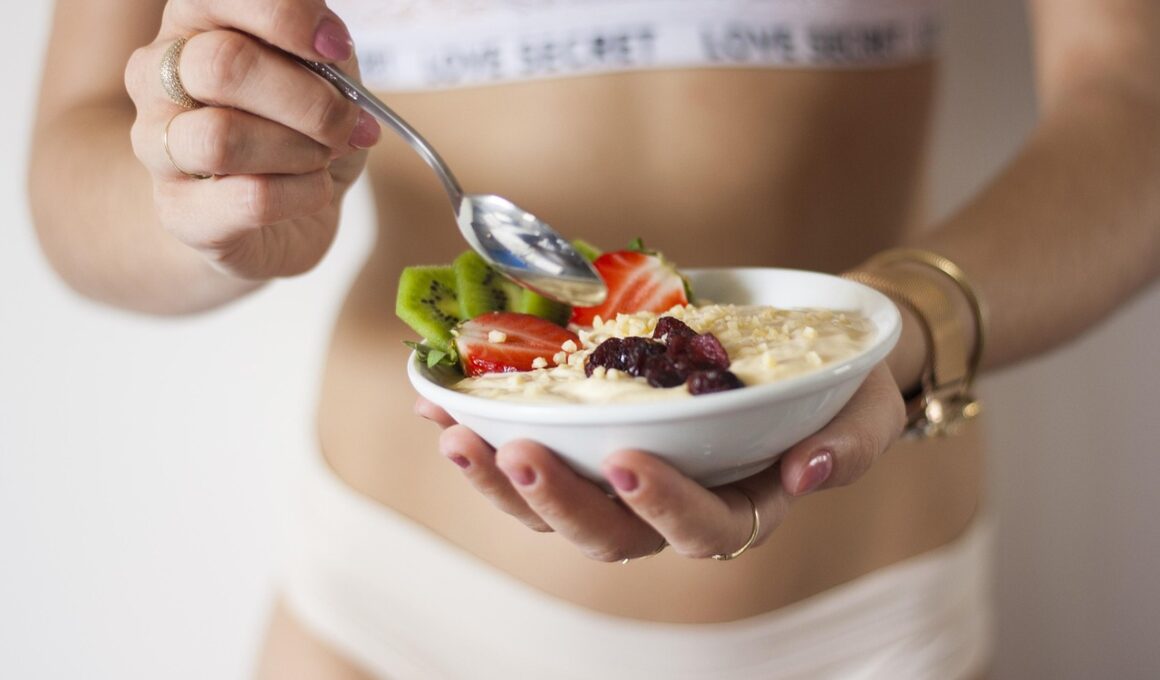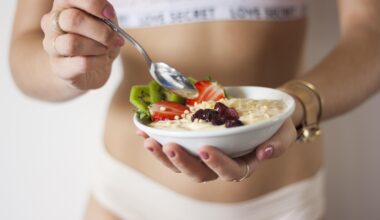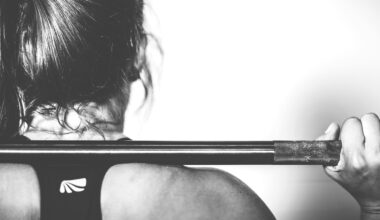Impact of Nutrition on HIIT Effectiveness: What Science Says
The effectiveness of High-Intensity Interval Training (HIIT) hinges significantly on various factors, one of which is nutrition. Nutrition plays a pivotal role in maximizing the benefits derived from HIIT workouts, contributing to enhanced performance and recovery. Consuming a balanced diet rich in macronutrients, vitamins, and minerals supports energy levels, allowing individuals to perform at their peak during high-intensity sessions. HIIT involves alternating between intense bursts of exercise and periods of rest or lower-intensity exercise, requiring energy sources to fuel these demanding efforts. Proper nutritional strategies, such as pre-workout meals and recovery snacks, can enhance performance. For instance, carbohydrates serve as the primary energy source, especially during vigorous exercise, while proteins are crucial for muscle repair and growth. Adequate hydration is equally essential as it influences physical performance and recovery. Scientific studies suggest that a diet tailored to HIIT can lead to improvements in overall health, fitness levels, and body composition. The best approach often involves personalized nutrition plans that align with individual needs, training schedules, and specific fitness goals. Such plans can significantly aid in maximizing HIIT effectiveness and overall results.
Understanding the role of carbohydrates in HIIT is crucial for optimizing training results. Carbs are the body’s primary energy source during high-intensity workouts, directly influencing performance. Studies indicate that consuming carbohydrates before a HIIT session can enhance endurance and power output. They help replenish glycogen stores in muscle cells, which are depleted during intense exercise. This replenishment is essential for sustaining performance, particularly during repeated high-intensity efforts. Furthermore, research shows that post-workout carbohydrate intake supports recovery by aiding in glycogen resynthesis. This process is vital for anyone looking to maximize their HIIT efficiency, as adequate recovery allows for subsequent workouts to be performed at high intensities. A balance between simple and complex carbohydrates can provide both immediate energy and lasting fuel. For instance, fruits and whole grains are excellent options for pre and post-exercise nutrition. Additionally, timing is key; consuming carbs shortly before or after exercise maximizes their effectiveness. Ultimately, strategically incorporating carbohydrates into a nutrition plan can lead to significant improvements in HIIT outcomes, highlighting the profound connection between diet and exercise performance.
Importance of Protein for Muscle Recovery
Protein is another macronutrient that significantly impacts HIIT effectiveness, primarily regarding muscle recovery and growth. Engaging in HIIT can lead to muscle fatigue and micro-tears, necessitating adequate protein intake for optimal recovery. Research suggests that including protein in post-workout nutrition is essential for repairing and building muscle tissue. The timing of protein consumption can also influence recovery, with studies highlighting benefits from consuming protein shortly after exercise. This practice ensures that amino acids are readily available for muscle repair. Additionally, protein aids in reducing soreness and fatigue, promoting a quicker return to training. Sources of protein, such as lean meats, dairy products, legumes, and plant-based proteins, should be incorporated into meals following HIIT sessions. A common guideline suggests a protein intake of 20–30 grams post-workout to enhance recovery effectively. However, individual needs may vary depending on body weight and training intensity. By prioritizing protein intake in a nutritional strategy, individuals can support recovery and ultimately improve their HIIT training outcomes and overall fitness levels.
Hydration is another critical factor that influences the effectiveness of HIIT workouts. Dehydration can lead to decreased performance, increased injury risk, and prolonged recovery times. Studies show that even mild dehydration can significantly impair physical performance, emphasizing the importance of adequate fluid intake before, during, and after HIIT sessions. Water is essential, but electrolytes may also be necessary for extended or particularly intense workouts. Replenishing lost fluids and electrolytes helps maintain optimal muscle function and overall performance. It’s advisable to hydrate well in advance of workouts, as adequate pre-workout hydration can improve workload tolerance during high-intensity efforts. The recommended fluid intake varies but generally suggests about 500–600 mL of water two to three hours before exercising. During workouts, particularly intense HIIT sessions, maintaining hydration can be achieved with water or electrolyte drinks. Post-workout hydration is equally important to replace lost fluids and support recovery. Overall, understanding the importance of hydration within a nutrition framework can lead to enhanced HIIT performance and better workout experiences.
Timing of Meals: Pre-Workout and Post-Workout Nutrition
The timing of meals can greatly influence the effectiveness of HIIT workouts. Pre-workout nutrition sets the stage for performance, while post-workout nutrition is essential for recovery. Research shows that consuming balanced meals—containing carbohydrates and proteins—approximately two to three hours before training can significantly enhance energy levels, focus, and overall workout intensity. Conversely, skipping meals or delaying intake can negatively impact performance, leading to fatigue or decreased outputs. Refueling the body with nutrients after a workout is equally critical, as it provides the necessary components for recovery and muscle repair. Studies suggest that consuming a nutrient-rich meal or snack within 30 minutes to two hours post-exercise optimizes the recovery process. This is often referred to as the “anabolic window,” during which the body is primed to absorb nutrients effectively. Practicing good meal timing may require planning to ensure availability and convenience. For example, many athletes benefit from meal prepping to adhere to their nutritional guidelines consistently. Ultimately, optimizing meal timing around HIIT can lead to improved performance, quicker recovery, and better overall results.
Micronutrients also play a crucial role in supporting HIIT effectiveness, though they are often overlooked in comparison to macronutrients. Vitamins and minerals are vital for various bodily functions, including energy metabolism and muscle contraction. For instance, B vitamins support energy production, while minerals such as magnesium and zinc are essential for muscle function and recovery. Insufficient intake of these nutrients could lead to suboptimal performance in HIIT workouts. Antioxidants, found in fruits and vegetables, can help mitigate oxidative stress resulting from high-intensity exercise. Incorporating a colorful variety of fruits and vegetables into the diet ensures a diverse range of micronutrients, promoting overall health and well-being. Research indicates that athletes consuming adequate levels of vitamins and minerals experience less fatigue and faster recovery. Therefore, focusing on a nutrient-dense diet can enhance HIIT training efficiency. Supplements may be beneficial for those with specific deficiencies or dietary restrictions; however, obtaining these nutrients from whole foods should be the primary goal. By understanding and addressing micronutritional needs, individuals can enhance their HIIT training effectiveness.
Balancing Nutrition with HIIT Goals
To maximize HIIT effectiveness, it is crucial to align nutrition with personal fitness goals, such as fat loss, muscle gain, or improved endurance. Each goal may require tailored nutritional strategies to achieve optimal results. For instance, those aiming for fat loss often benefit from a caloric deficit combined with higher protein intake to preserve lean muscle mass. In contrast, individuals focused on muscle gain may need to increase their caloric intake while ensuring an adequate protein supply for muscle synthesis. Carbohydrate needs may also vary significantly based on the intensity and frequency of HIIT workouts. Ensuring that the chosen nutrition plan supports individual goals can significantly influence workout outcomes and overall performance. Working with a nutritionist or dietitian can help refine personal plans aligned with specific HIIT goals, addressing individual preferences, dietary restrictions, and lifestyle factors. Moreover, tracking progress and making necessary adjustments is essential for ongoing improvement. Incorporating a balancing act between nutritional intake and exercise performance will optimize HIIT outcomes and accelerate progress toward fitness ambitions.
In conclusion, the interplay between nutrition and High-Intensity Interval Training significantly impacts overall effectiveness and performance. Key factors such as carbohydrate availability, protein intake, hydration, meal timing, and micronutrient balance play vital roles in maximizing HIIT benefits. Evidence from scientific studies consistently supports the idea that tailored nutrition strategies can enhance physical performance, recovery, and muscle growth. For individuals looking to maximize their HIIT workouts, a comprehensive understanding of these factors is essential for developing a successful nutrition plan that aligns with their specific fitness goals. Experimentation with meal timing and adjusting nutrient ratios may lead to superior results over time. Additionally, consulting with nutrition professionals can provide valuable insights for creating personalized plans. Ultimately, prioritizing nutrition, alongside a solid training regimen, creates a balanced approach to fitness. When individuals harmonize their dietary choices with their exercise routines, they are more likely to achieve their desired results, whether that be enhanced performance, weight management, or overall health improvement. Therefore, to make the most of HIIT, focus on both nutrition and training equally to fully harness the benefits of this highly effective workout method.


